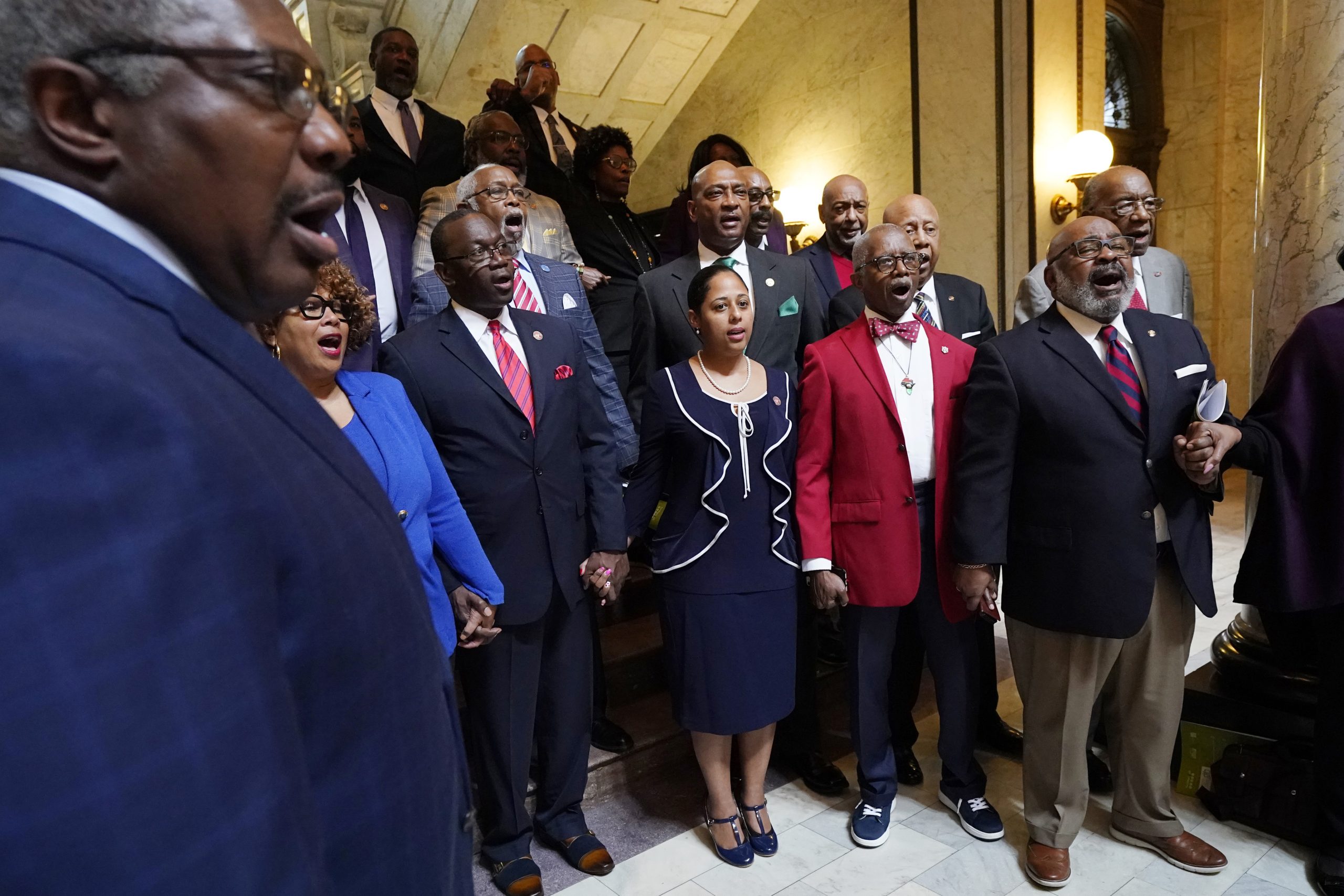Mississippi Today
Republicans don’t have to listen to their Black colleagues. That’s how they designed it.

Republicans don’t have to listen to their Black colleagues. That’s how they designed it.
Note: This editorial anchored Mississippi Today’s weekly legislative newsletter. Subscribe to our free newsletter for exclusive access to legislative analysis and up-to-date information about what’s happening under the Capitol dome.
Mississippi Republican legislative leaders don’t have to listen when their Black colleagues tell them that they’re stripping voting power from Black Mississippians.
They don’t have to listen when they’re told that they’re passing a bill that is bound for yet another federal court battle, that they’re stoking racial division across the state, that they’re once again drawing horrible national attention, that they’re dragging Mississippi back in time.
Republicans have carefully created for themselves a legislative body with virtually unlimited and unchecked power. It allows them to completely shut people who don’t look like them or think like them out of the legislative process, and they often use it to pass legislation that stretches the limits of democracy.
This is no accident. Over the past 30 years, as Mississippi’s electorate shifted from the Democratic to Republican Party, Republicans used their newfound power to strategically redraw legislative districts and give themselves supermajority control of both the Senate and House. They can, without any say whatsoever from Democrats, pass any bill they want. Inside the Capitol, a small handful of GOP leaders have drawn up rules that give them all the power, and rank-and-file legislators — including the vast majority of Republican legislators — wield little influence over what passes or fails.
Democrats, meanwhile, the party of the overwhelming majority of Black Mississippians, have no voting power at all inside the Capitol. They can give impassioned speeches at the wells, they can stretch debates to four-plus hours, they can walk off the floor to protest racist bills, they can hold fiery press conferences, but they cannot stop Republicans from passing any single piece of legislation.
There is almost never partisan compromise. There is rarely genuine debate. There is plenty of one-sided control.
READ MORE: The purposefully broken lawmaking process in Jackson
With this power, Republicans have passed all sorts of legislation the past couple years despite vocal pushback from Black lawmakers: a critical race theory ban, which famously led every Black senator to walk off the floor in protest before the final vote; tighter legislative and congressional redistricting maps that diluted Black voting strength; the nation’s strictest voting laws in a state with a sordid, racist history; massive tax cuts that disproportionately affect poor and Black taxpayers; and anti-LGBTQ legislation that threatens the lives of a vulnerable population.
But perhaps no legislation better showcases the unilateral GOP control under the dome better than House Bill 1020, which passed the House late in the evening of Feb. 7.
Yes, the national headlines you read last week were accurate: A mostly-white House supermajority passed a bill that would create a completely white-appointed judicial district and expand the police force within the whiter areas of Jackson, the Blackest large city in America.
For more than four hours, Black House members delivered what should be certainly considered some of the most cautionary and impassioned speeches ever made in the Mississippi State Capitol building. Many of their comments echoed ones made by their predecessors in the building and civil rights leaders of 60 years ago.
Rep. Ed Blackmon, D-Canton: “Only in Mississippi would we have a bill like this, with our history, where you say solving the problem is taking the vote away from Black people because we don’t know how to choose our leaders … This is just like the 1890 Constitution all over again. We are doing exactly what they said they were doing back then: ‘Helping those people because they can’t govern themselves.'”
Rep. Solomon Osborne, D-Greenwood: “I don’t even know why I’m down here, frankly, because it’s like being at a Klan rally with people with suits on. That’s the only difference I see between these people here. They wear suits rather than sheets … Every day we get up here and open this body with prayer. I wonder what God are these people praying to?”
Rep. John Hines, D-Greenville: “Again, we end up being the laughingstock of America because of what we do here today.”
While Black House members were doing all they could to plead with the humanity of their GOP colleagues, a large number of Republicans left the House floor altogether for a majority of the debate, reappearing from the back halls of the Capitol to cast a final “yea” vote. House Speaker Philip Gunn sat on the speaker’s dais leaned back in his chair with his legs crossed, talking regularly with various Republicans who came to visit with him. Rep. Trey Lamar, the GOP leader who authored and defended House Bill 1020 on the floor floor, sat behind the well and scrolled his phone.
They didn’t seem to listen to what their Black colleagues were saying. They didn’t have to.
Now the bill moves to the Senate, in recent years the more moderate of the two chambers. But it’s an election year, and Republicans believe nothing seems to motivate Republican voters more than being “tough on crime.” And this is Mississippi, so being tough on crime in the Blackest city in America is probably not the worst thing for Republicans who want to go home and flaunt their GOP bonafides.
Considering legislative Republicans have passed legislation in recent years that they knew would face federal lawsuits to hopefully draw the attention and reforming action of the U.S. Supreme Court — remember Dobbs v. Jackson Women’s Health Organization? — it’s difficult to write off anything that moves through the Mississippi State Capitol.
Meanwhile, the Republican supermajority rolls on for at least six more weeks this session. And if you’re hoping political change is on the horizon, there’s more bad news. According to a recent Mississippi Today analysis of this year’s legislative elections, there’s no possible way the GOP will lose control.
For at least four more years, the current trajectory of policy making in Mississippi could very well continue.
READ MORE: Republicans again a lock to control Legislature after November election
This article first appeared on Mississippi Today and is republished here under a Creative Commons license.
Mississippi Today
On this day in 1961


Nov. 22, 1961

Five Black students, made up of NAACP Youth Council members and two SNCC volunteers from Albany State College, were arrested after entering the white waiting room of the Trailways station in Albany, Georgia.
The council members bonded out of jail, but the SNCC volunteers, Bertha Gober and Blanton Hall declined bail and “chose to remain in jail over the holidays to dramatize their demand for justice,” according to SNCC Digital Gateway. The president of Albany State College expelled them.
Gober became one of SNCC’s Freedom Singers and wrote the song, “We’ll Never Turn Back,” after the 1961 killing of Herbert Lee in Mississippi. The tune became SNCC’s anthem.
After her release from jail, Gober joined other students, and police arrested her and other demonstrators. Back in the same jail, she sang to the police chief and mayor to open the cells, “I hear God’s children praying in jail, ‘Freedom, freedom, freedom.’”
Albany State suspended another student, Bernice Reagon, after she joined SNCC. She poured herself into the civil rights movement and later formed the Grammy-nominated a cappella group Sweet Honey in the Rock to educate and empower the audience and community.
“When I opened my mouth and began to sing, there was a force and power within myself I had never heard before,” a power she said she did not know she had.
Other members of the Freedom Singers included Cordell Reagon, Bernice Johnson, Dorothy Vallis, Rutha Harris, Bernard Lafayette and Charles Neblett. On the third anniversary of the sit-in movement in 1963, they performed at Carnegie Hall.
“This is a singing movement,” SNCC leader James Forman told a reporter. “The songs help. Without them, it would be ugly.”
Today, the Albany Civil Rights Institute houses exhibits on these protesters, Martin Luther King Jr. and others who joined the Albany Movement.
This article first appeared on Mississippi Today and is republished here under a Creative Commons license.![]()
Mississippi Today
IHL deletes the word ‘diversity’ from its policies

The governing board of Mississippi’s public universities voted Thursday to delete the word “diversity” from several policies, including a requirement that the board evaluate university presidents on campus diversity outcomes.
Though the Legislature has not passed a bill targeting diversity, equity and inclusion initiatives in higher education, the Institutions of Higher Learning Board of Trustees approved the changes “in order to ensure continued compliance with state and federal law,” according to the board book.
The move comes on the heels of the re-election of former President Donald Trump and after several universities in Mississippi have renamed their diversity offices. Earlier this year, the IHL board approved changes to the University of Southern Mississippi’s mission and vision statements that removed the words “diverse” and “inclusiveness.”
In an email, John Sewell, IHL’s communications director, did not respond to several questions about the policy changes but wrote that the board’s goal was to “reinforce our commitment to ensuring students have access to the best education possible, supported by world-class faculty and staff.”
“The end goal is to support all students, and to make sure they graduate fully prepared to enter the workforce, hopefully in Mississippi,” Sewell added.
On Thursday, trustees approved the changes without discussion after a first reading by Harold Pizzetta, the associate commissioner for legal affairs and risk management. But Sewell wrote in an email that the board discussed the policy amendments in open session two months ago during its retreat in Meridian, more than an hour away from the board’s normal meeting location in Jackson.
IHL often uses these retreats, which unlike its regular board meetings aren’t livestreamed and are rarely attended by members of the public outside of the occasional reporter, to discuss potentially controversial policy changes.
Last year, the board had a spirited discussion about a policy change that would have increased its oversight of off-campus programs during its retreat at the White House Hotel in Biloxi. In 2022, during a retreat that also took place in Meridian, trustees discussed changing the board’s tenure policies. At both retreats, a Mississippi Today reporter was the only member of the public to witness the discussions.
The changes to IHL’s diversity policy echo a shift, particularly at colleges and universities in conservative states, from concepts like diversity in favor of “access” and “opportunity.” In higher education, the term “diversity, equity and inclusion” has traditionally referred to a range of efforts to comply with civil rights laws and foster a sense of on-campus belonging among minority populations.
But in recent years, conservative politicians have contended that DEI programs are wasteful spending and racist. A bill to ban state funding for DEI in Mississippi died earlier this year, but at least 10 other states have passed laws seeking to end or restrict such initiatives at state agencies, including publicly funded universities, according to ABC News.
In Mississippi, the word “diversity” first appeared in IHL’s policies in 1998. The diversity statement was adopted in 2005 and amended in 2013.
The board’s vote on Thursday turned the diversity statement, which was deleted in its entirety, into a “statement on higher education access and success” according to the board book.
“One of the strengths of Mississippi is the diversity of its people,” the diversity statement read. “This diversity enriches higher education and contributes to the capacity that our students develop for living in a multicultural and interdependent world.”
Significantly, the diversity statement required the IHL board to evaluate the university presidents and the higher learning commissioner on diversity outcomes.
The statement also included system-wide goals — some of which it is unclear if the board has achieved — to increase the enrollment and graduation rates of minority students, employ more underrepresented faculty, staff and administrators, and increase the use of minority-owned contractors and vendors.
Sewell did not respond to questions about if IHL has met those goals or if the board will continue to evaluate presidents on diversity outcomes.
In the new policy, those requirements were replaced with two paragraphs about the importance of respectful dialogue on campus and access to higher education for all Mississippians.
“We encourage all members of the academic community to engage in respectful, meaningful discourse with the aim of promoting critical thinking in the pursuit of knowledge, a deeper understanding of the human condition, and the development of character,” the new policy reads. “All students should be supported in their educational journey through programming and services designed to have a positive effect on their individual academic performance, retention, and graduation.”
Also excised was a policy that listed common characteristics of universities in Mississippi, including “a commitment to ethnic and gender diversity,” among others. Another policy on institutional scholarships was also edited to remove a clause that required such programs to “promote diversity.”
“IHL is committed to higher education access and success among all populations to assist the state of Mississippi in meeting its enrollment and degree completion goals, as well as building a highly-skilled workforce,” the institutional scholarship policy now reads.
The board also approved a change that requires the universities to review their institutional mission statements on an annual basis.
A policy on “planning principles” will continue to include the word “diverse,” and a policy that states the presidential search advisory committees will “be representative in terms of diversity” was left unchanged.
This article first appeared on Mississippi Today and is republished here under a Creative Commons license.![]()
Mississippi Today
Closed St. Dominic’s mental health beds to reopen in December under new management

The shuttered St. Dominic’s mental health unit will reopen under the management of a for-profit, Texas-based company next month.
Oceans Behavioral Hospital Jackson, a 77-bed facility, will provide inpatient behavioral health services to adults and seniors and add intensive outpatient treatment services next year.
“Jackson continuously ranks as one of the cities for our company that shows one of the greatest needs in terms of behavioral health,” Oceans Healthcare CEO Stuart Archer told Mississippi Today at a ribbon cutting ceremony at its location on St. Dominic’s campus Thursday. “…There’s been an outcry for high quality care.”
St. Dominic’s 83-bed mental health unit closed suddenly in June 2023, citing “substantial financial challenges.”
Merit Health Central, which operates a 71-bed psychiatric health hospital unit in Jackson, sued Oceans in March, arguing that the new hospital violated the law by using a workaround to avoid a State Health Department requirement that the hospital spend at least 17% of its gross patient revenue on indigent and charity care.
Without a required threshold for this care, Merit Health Central will shoulder the burden of treating more non-paying patients, the hospital in South Jackson argued.
The suit, which also names St. Dominic’s Hospital and the Mississippi Department of Health as defendants, awaits a ruling from Hinds County Chancery Court Judge Tametrice Hodges-Linzey next year.
The complaint does not bar Oceans from moving forward with its plans to reopen, said Archer.

Oceans operates two other mental health facilities in Mississippi and over 30 other locations in Louisiana, Oklahoma and Texas.
“Oceans is very important to the Coast, to Tupelo, and it’s important right here in this building. It’s part of the state of Mississippi’s response to making sure people receive adequate mental health care in Mississippi,” said Lt. Governor Delbert Hosemann at the Nov. 21 ribbon cutting.
Some community leaders have been critical of the facility.
“Oceans plans to duplicate existing services available to insured patients while ignoring the underserved and indigent population in need,” wrote Hinds County Sheriff Tyree Jones in an Oct. 1 letter provided to Mississippi Today by Merit Health.
Massachusetts-based Webster Equity Partners, a private-equity firm with a number of investments in health care, bought Oceans in 2022. St. Dominic’s is owned by Louisiana-based Catholic nonprofit Franciscan Missionaries of Our Lady Health System.
Oceans first filed a “certificate of need” application to reopen the St. Dominic’s mental health unit in October 2023.
Mississippi’s certificate of need law requires medical facilities to receive approval from the state before opening a new health care center to demonstrate there is a need for its services.
The Department of Health approved the application under the condition that the hospital spend at least 17% of its patient revenue on free or low-cost medical care for low-income individuals – far more than the two percent it proposed.

Oceans projected in its application that the hospital’s profit would equal $2.6 million in its third year, and it would spend $341,103 on charity care.
Merit Health contested the conditional approval, arguing that because its mental health unit provides 22% charity care, Oceans providing less would have a “significant adverse effect” on Merit by diverting more patients without insurance or unable to pay for care to its beds.
Oceans and St. Dominic’s also opposed the state’s charity care condition, arguing that 17% was an unreasonable figure.
But before a public hearing could be held on the matter, Oceans and St. Dominic’s filed for a “change of ownership,” bypassing the certificate of need process entirely. The state approved the application 11 days later.
Merit Health Central then sued Oceans, St. Dominic and the State Department of Health, seeking to nullify the change of ownership.
“The (change of ownership) filing and DOH approval … are nothing more than an ‘end run’ around CON law,” wrote Merit Health in the complaint.
Oceans, St. Dominic’s and the Mississippi Department of Health have filed motions to dismiss the case.
This article first appeared on Mississippi Today and is republished here under a Creative Commons license.![]()
-

 Local News6 days ago
Local News6 days agoCelebrate the holidays in Ocean Springs with free, festive activities for the family
-

 News from the South - Georgia News Feed7 days ago
News from the South - Georgia News Feed7 days ago'Hunting for females' | First day of trial in Laken Riley murder reveals evidence not seen yet
-

 News from the South - Alabama News Feed7 days ago
News from the South - Alabama News Feed7 days agoFirst woman installed as commanding officer of NAS Pensacola
-

 Kaiser Health News4 days ago
Kaiser Health News4 days agoA Closely Watched Trial Over Idaho’s Near-Total Abortion Ban Continues Tuesday
-

 Mississippi Today6 days ago
Mississippi Today6 days agoOn this day in 1972
-

 News from the South - Alabama News Feed3 days ago
News from the South - Alabama News Feed3 days agoTrial underway for Sheila Agee, the mother accused in deadly Home Depot shooting
-

 News from the South - Georgia News Feed2 days ago
News from the South - Georgia News Feed2 days agoJose Ibarra found guilty in murder of Laken Riley | FOX 5 News
-

 News from the South - Alabama News Feed3 days ago
News from the South - Alabama News Feed3 days agoAlabama's weather forecast is getting colder, and a widespread frost and freeze is likely by the …































